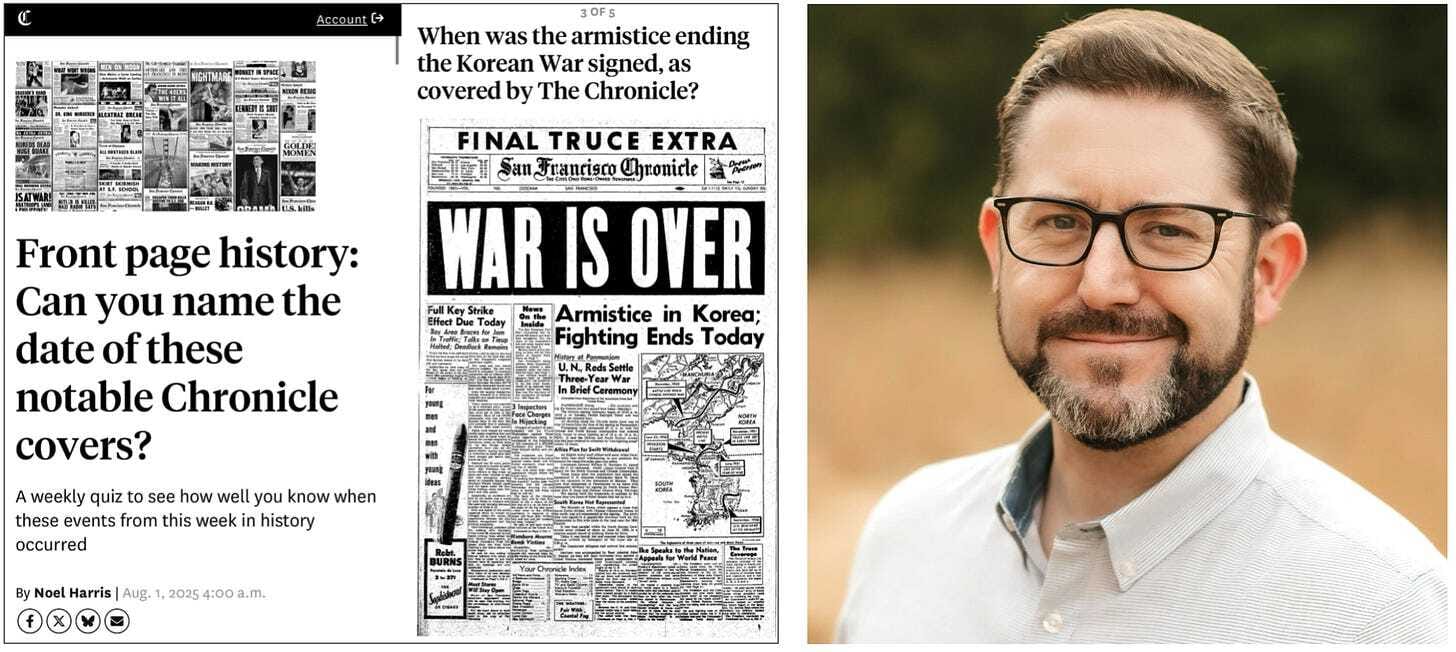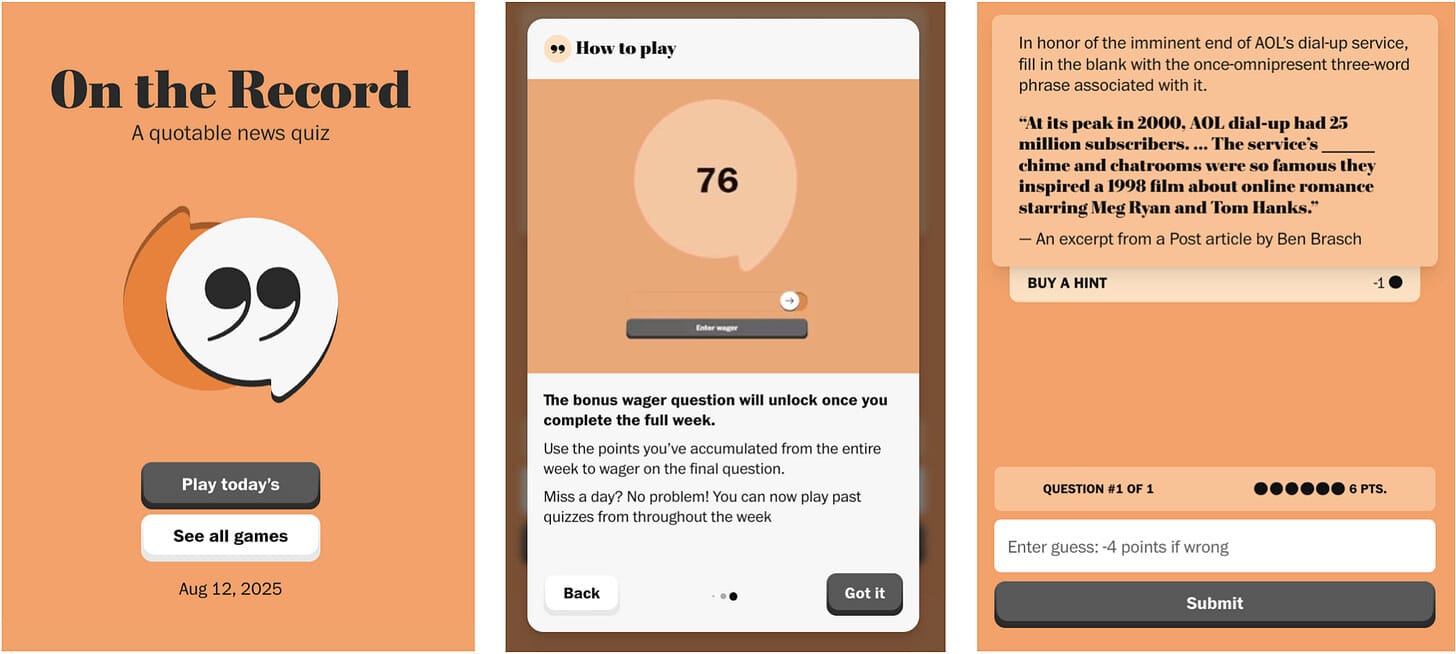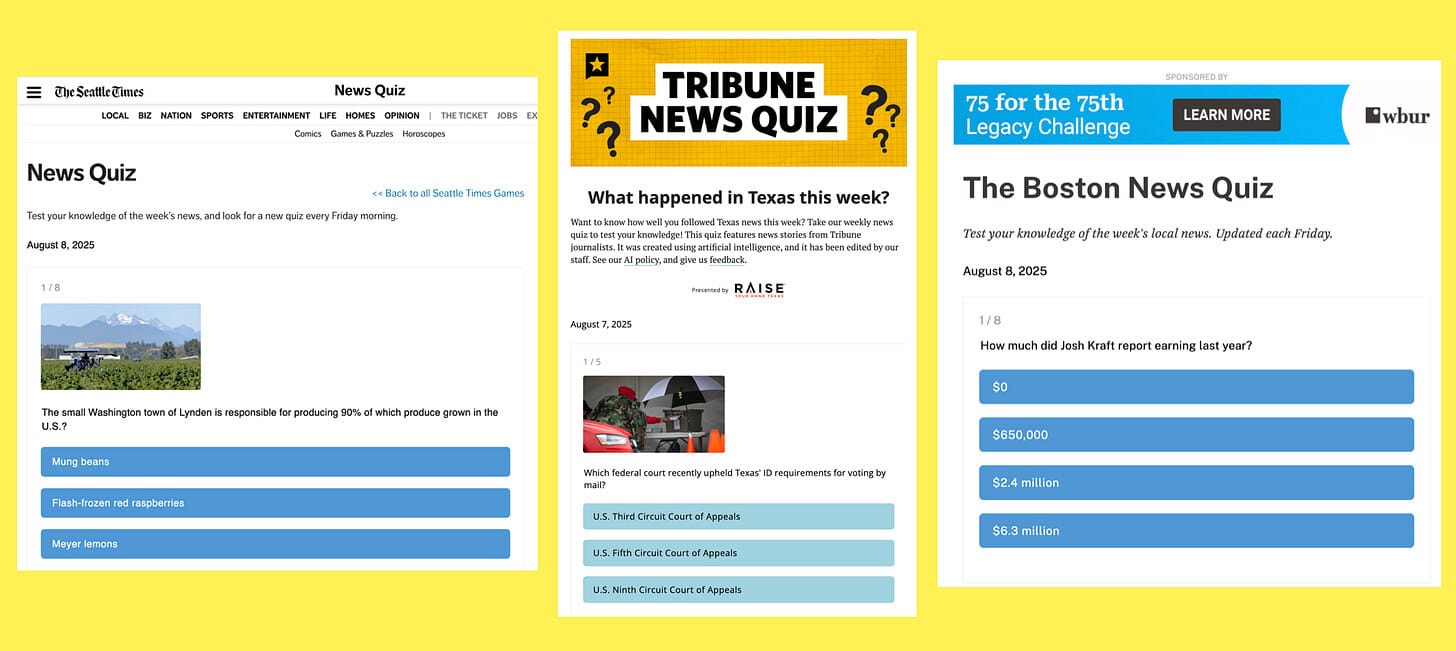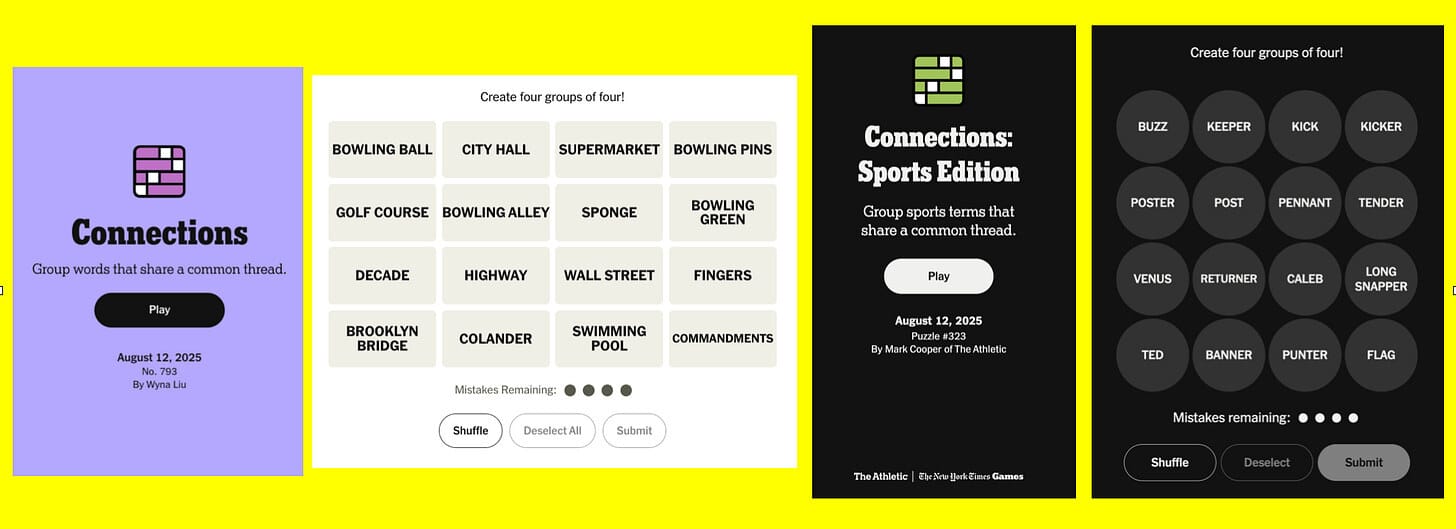
“The San Francisco Chronicle history quiz is built on the back of the 156 years of SF Chronicle reporting," says Hearst’s DevHub leader Tim O'Rourke
TL;DR: The humble news quiz is having a moment. Once relegated to the back pages of newspapers and magazines, quizzes are increasingly becoming sophisticated engagement tools to convert casual readers into loyal subscribers. And the latest trend: news publishers are using artificial intelligence to scale quiz production in ways that would have been impossible just a few years ago.
The Traditional Approach: Human-Created News Quizzes
Major American news publishers have long embraced news quizzes as both engagement tools and brand differentiators, each with distinct approaches reflecting their audience and mission.
NPR operates a weekly news quiz, covering everything from politics to pop culture with a characteristic mix of serious news and lighthearted commentary. Recent quizzes have featured topics ranging from "massive manhunts" and "volcanic eruptions" to "celebrity antics" and "presidential decrees," showcasing the breadth of contemporary news coverage. And NPR's iconic show "Wait Wait... Don't Tell Me!”, launched in 1998 on Chicago's public radio station WBEZ, has become one of NPR's most successful programs. The humoristic news quiz show is syndicated to 520 public radio stations nationwide and reaches nearly 3 million weekly listeners on radio plus an additional 1 million monthly podcast downloads.
CNN produces a 5 Things Weekly News Quiz that ties directly to its popular morning newsletter, creating a synergy between different content products. Recent editions have covered major news like political developments, international events, and breaking news stories, maintaining CNN's focus on current affairs while adding an interactive element.
The Washington Post launched On the Record in February 2023 as "the first game developed in-house," according to Christopher Meighan, who was then director of emerging news products. The daily quiz challenges players to identify notable quotes from top stories, offering single-question quizzes Monday through Thursday and longer weekend editions.
Bloomberg launched Pointed in March 2025, a free weekly format based on economic and financial news that positions itself as "the news quiz for risk-takers.”
The New York Times publishes a news quiz every Friday, based on events of the week and compiled by the staff of the Morning newsletter.

The Washington Post’s news quiz On the Record
The AI Approach: News Quiz Production at Scale
A newer wave of publishers has embraced artificial intelligence to streamline quiz production.
The transformation is perhaps most visible at Hearst Newspapers, where Tim O'Rourke's DevHub team has built Emcee (multiple choice), an AI-powered quiz generation engine. "Emcee is built on the back of our newsrooms' reported, edited and vetted work. No hallucinations here," O'Rourke, vice president of content strategy at Hearst, explained in our recent conversation. "We scrape our most popular stories, use GenAI to turn the stories into a multiple-choice format, spin up one of the DevHub's interactive Quiz templates, and alert the editor."
This is a significant shift in how quiz content gets produced. What used to be "as much of a full day worth of work" for newsroom staff now takes "a half hour or an hour of editing review," according to O'Rourke. The time savings are significant enough that Hearst tracks "KPIs [Key Performance Indicators] around how many human hours are saved on this kind of rote, repeatable work that we can then funnel into more reporting.”
Other examples:
TIME Magazine partnered with ChatGPT in June 2023 to mine its century-old archives for quiz content. Following the removal of TIME's digital paywall, the publication saw an opportunity to turn "200 million words" of historical journalism into engaging quiz content. The partnership represents one of the most significant early experiments in using generative AI for content creation by a major legacy media organization. After several rounds of prompt engineering and quality controls, this quiz experiment evolved into a comprehensive multi-year content deal and strategic partnership announced in 2024.
NRI Nation, a website for the Indian diaspora, founded by AI expert Nikita Roy and produced in the incubator of the Harvard Innovation Lab, was another pioneer in AI-generated news quizzes. In 2023, the team developed the GPT-4 based Google Docs extension "AI Assist” as part of the Generative AI Newsroom Challenge. The tool assisted with headlines, SEO metadata, social media posts and with producing news quizzes. Key takeaways from their quiz prompt engineering process included the importance of iterative refinement, leveraging GPT's ability to create its own prompts, being precise and specific in requirements, and using system prompts to assign specific roles to improve accuracy. However, the team ultimately concluded that while GPT-4 showed promise for automating quiz creation, its general training didn't fully align with their publication's unique tone and standards.
Creating AI News Quizzes With Vendor Help
Several US news organizations are striving to reduce the considerable editorial effort of producing news quizzes even further by not only employing Gen AI but also by using a vendor to provide the framework. News Games bills itself as offering "AI-powered news quizzes, crosswords, and word puzzles for news publishers" and promises to "easily offer online word puzzles and quizzes uniquely based on your news content.” Among their more than a dozen US clients are The Seattle Times, The Texas Tribune and the public radio station WBUR in Boston with their weekly news quizzes.

The Seattle Times, The Texas Tribune and WBUR all use the same news quiz vendor
Strikingly, while The Seattle Times explicitly states that their questions and answers were "created with help from an artificial intelligence tool that's carefully steered and overseen by our very human editors” and The Texas Tribune similarly acknowledges AI usage, WBUR doesn't explicitly disclose the use of an automated system.
News Quizzes Power Subscriptions and Engagement
What makes these quiz initiatives - with or with the use of Gen AI - significant is their role as driver of subscription revenue and audience engagement, showing impressive results.
The Washington Post reported substantial engagement success since launching "On the Record." Engagement in our games is at an all-time high with a majority of users returning to play, some as many as 30 times in the same month," Christopher Meighan noted, emphasizing how the quiz "connects players to Post journalism in a new, fun and interactive way.”
The New York Times provides the most comprehensive success metrics available, demonstrating how games in general can drive news engagement. Wordle alone is bringing tens of millions of new users every year since the NYT acquired it in January 2022. Jonathan Knight, Senior Vice President and Head of Games at The New York Times, told Digiday in 2023 that "subscribers who engage with both news and games together on any given week have the strongest long-term subscriber retention profile of any at the Times."
Wordle, Connections, the Crossword Puzzle and other NYT games are not built on knowledge of current events. But on Super Bowl Sunday, February 9, 2025, the NYT launched Connections Sports Edition, a spinoff of Connections that ties sports reporting with news-adjacent sports content. This quiz, so far, doesn’t live in the app or in the games section on the NYT website, but can only be accessed through The Athletic, the sports journalism site that the NYT acquired for $550 million in 2022. Written by Mark Cooper, The Athletic's managing editor who became their puzzle editor, the sports version demonstrates how specialized knowledge of sports fans can drive quiz engagement. Unlike regular Connections, Cooper noted that the sports edition "relied more on a trivia component to solve," making it functionally similar to news quizzes that test current events knowledge.

The general version of Connections (left) versus the Sports Edition
Publishers increasingly view interactive, gamified and personalized experiences as important drivers of engagement and ultimately paid subscriptions. News quizzes tie into all three experiences with measurable success. This performance extends beyond simple engagement metrics into measurable business outcomes. "We see it as a value add for keeping our most important readers happy and engaged in understanding that we can deliver things in the local market that are unique and have value that they can't get anywhere else," O'Rourke explained about Hearst's approach.
Bloomberg's strategy with Pointed emphasizes engagement over explicit subscription conversion. "Pointed is a uniquely Bloomberg experience," Joel Weber, head of Bloomberg Explains and Games, told MediaPost. "We're excited to pursue games as a new content category and engage users in unexpected ways." The quiz is free to play, positioning it as a brand engagement tool that showcases Bloomberg's expertise in current affairs while potentially driving users to other Bloomberg products.
Beyond Entertainment: Strategic Differentiation
Publishers are positioning quizzes as strategic differentiators in an increasingly competitive attention economy. O'Rourke sees quiz content as part of a larger effort to make news organizations "more independent from search" and create "unique local reader tools and interactives and guides."
At Hearst, quizzes vary significantly across markets, reflecting local priorities and expertise. "One market, it might be a simple news quiz of the current events of the week and another market, it might be focused on sports and another market, it's an archive like history type quiz that is built on the back of the 156 years of SF Chronicle reporting," O'Rourke told me.
This localization strategy addresses a key challenge in scaling innovation across news organizations: maintaining authenticity while achieving economies of scale. "Our philosophy is at its core, central technical expertise mixed with local market expertise," O'Rourke explained.
Despite the automation potential, successful news quiz operations maintain strict human oversight. At Hearst, "no direct publishing to the web; a human is in the loop and in control of every piece of content," according to O’Rourke. This approach reflects broader industry caution about AI-generated content. "We're in the accuracy business," O'Rourke emphasized during our interview. "We have to ensure that what we're publishing is accurate and that we aren't putting an unfair burden on our readers.”
In an interesting side note, Buzzfeed - who was the first publisher to use Gen AI in quiz content - is staying away altogether from news quizzes. The company launched Infinity Quizzes in February 2023, powered by ChatGPT. However, BuzzFeed’s quizzes focus entirely on entertainment content like "Create Your Own Rom-Com" and "Find Your Soulmate (Hint: It's a House Plant)" rather than current events or news knowledge testing. But that seems logical after their pivot from Pulitzer Prize winning hard news to pure entertainment.
Key Learnings for Publishers Considering News Quizzes
1. Prioritize Editorial Expertise Over Pure Automation: Hearst's success with Emcee demonstrates that the most effective quiz systems combine AI efficiency with deep editorial knowledge. Publishers should view AI as a production accelerator, not a replacement for editorial judgment.
2. Start with Your Strongest Content Areas: The Athletic's sports quiz success and Hearst's market-specific approach show that quiz content performs best when built on existing editorial strengths. Publishers should identify their most authoritative coverage areas whether local government, specific beats, or specialized topics and develop quiz content that showcases that expertise rather than attempting to cover all news broadly.
3. Design for Cross-Product Engagement, Not Standalone Success: The New York Times' retention data reveals the real value of quiz content: subscribers who engage with both news and games have significantly stronger retention profiles. This suggests publishers should position quizzes as engagement enhancers rather than standalone products. Bloomberg's free-to-play Pointed model exemplifies this approach, using the quiz to showcase expertise and drive users to other Bloomberg products rather than monetizing the quiz directly.
4. Measure Operational Efficiency Alongside Engagement: Hearst tracks "KPIs around how many human hours are saved" because quiz automation's value extends beyond reader metrics. Reducing quiz production from "a full day worth of work into a half hour or an hour of editing review" allows newsrooms to "funnel [time] into more reporting." Publishers should calculate both the engagement benefits and the resource reallocation potential when evaluating quiz initiatives.
5. Use Vendors For Cost Efficiency: Turnkey solutions like those provided by News Games allow publishers to quickly implement automated quiz systems without developing the technology in-house.
6. Create independence from search traffic: Daily or weekly news quizzes form habits and habituated users are a lot more valuable than fly-by users.